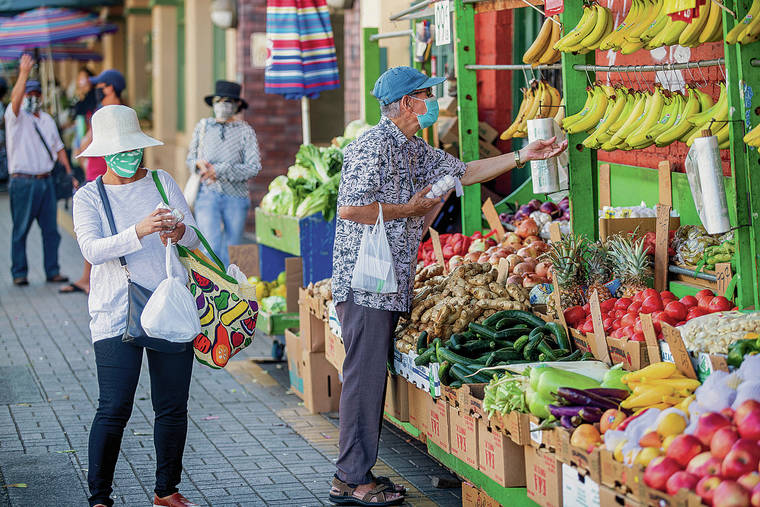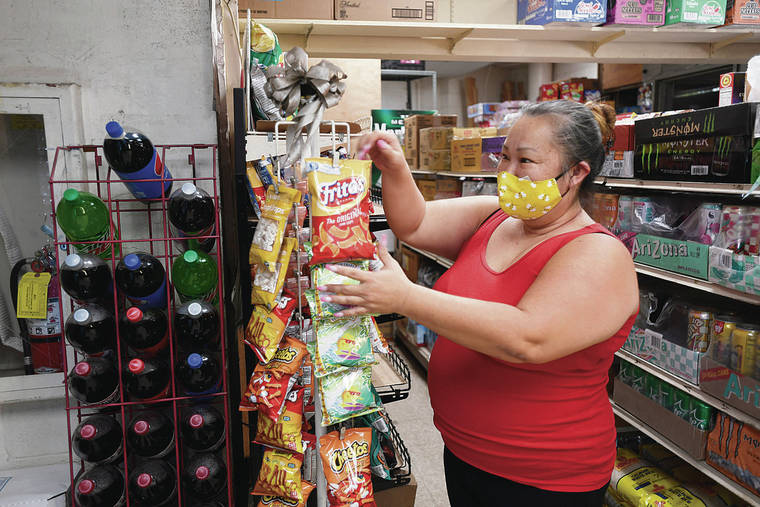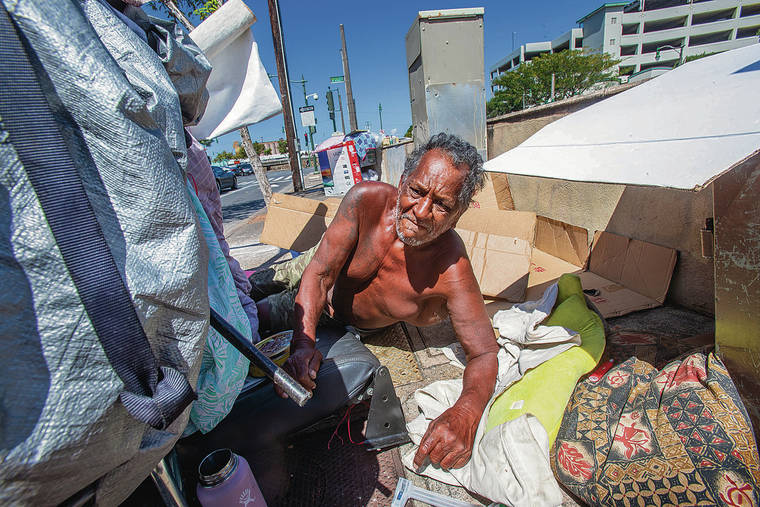Businesses, residents struggle for survival in Chinatown


DENNIS ODA / DODA@STARADVERTISER.COM
Many small businesses in Chinatown have remained closed because of the coronavirus but some have started to open on the Kekaulike Mall walkway, pictured here on Monday.

BRUCE ASATO / BASATO@STARADVERTISER.COM
A business on Hotel Street had its windows boarded up last week.

BRUCE ASATO / BASATO@STARADVERTISER.COM
Mary Gibson of Happy World Market on North Hotel Street continued to keep her store open Friday.

DENNIS ODA / DODA@STARADVERTISER.COM
71-year-old Daniel Cuevas, pictured at River and King streets, has been living on the streets for 40 years and got emotional talking about how hard it is.

CRAIG T. KOJIMA / CKOJIMA@STARADVERTISER.COM
Garbage has piled up on the sidewalk at the intersection of River and Hotel streets on the edge of Chinatown.






Chinatown’s Kekaulike Market saw a glimmer of encouragement when the week began with several dozen people shopping for produce following weeks of discouraging turnout.
The customers only represented 20% to 30% of a typical, pre-coronavirus shopping day at Kekaulike Market, said Eric Wong, who manages the Kekaulike Courtyards apartments in the middle of the market.
And by lunchtime, with no Chinatown restaurants offering dine-in service to keep shoppers around, the relatively small crowd at Kekaulike Market thinned to a trickle.
Chinatown merchants estimate that more than half of their fellow businesses have yet to reopen since the end of March. And many of them are boarded up with fresh sheets of plywood, giving Honolulu’s original neighborhood an eerie feeling.
Photo Gallery: Chinatown businesses in Hawaii hit hard by COVID-19 pandemic Opens in a new tab
“The last two weeks were dead,” Wong said. “Businesses are really struggling.”
Don't miss out on what's happening!
Stay in touch with breaking news, as it happens, conveniently in your email inbox. It's FREE!
Many of the merchants who run the remaining Chinatown businesses had a consistent message for shoppers who have stayed away since the start of the COVID-19 pandemic: They’re open for business, albeit with social distancing and other accommodations in place to address a new business climate.
In response to fears that the chances are greater of contracting COVID-19 in Chinatown, Mary Gibson, the owner of Happy World Market on Hotel Street, said:
“Just because we’re Chinatown, we’re not China,” Gibson said. “They (shoppers) shouldn’t be concerned as long as they wear a mask.”
Because a majority of shoppers are staying away, Chinatown’s homeless stand out even more.
But like half-a-dozen other Chinatown merchants, Gibson said the homeless never bothered her businesses before the pandemic and they’re not bothering her now.
“They’re the same,” agreed Joey Nguyen, who manages the Cuu-Long II Vietnamese Restaurant on River Street, which now serves only take-out food. “The majority are good, they’re cool.”
Sales at Cuu-Long II are easily down 50%, Nguyen said.
There has always been vandalism in the neighborhood, but Nguyen and others said it’s impossible to blame it on the homeless without clear evidence.
“I don’t think it’s the homeless at all,” Nguyen said.
Honolulu Police Department Capt. Mike Lambert, who leads HPD homeless response, told the Honolulu Star-Advertiser last week that HPD has seen no noticeable increase in crimes in Chinatown since the pandemic began.
“There’s nothing overwhelming,” Lambert said. “Overall, we haven’t seen an uptick in that type of issue, vandalism.”
However, Lambert said HPD has received more complaints from landlords about homeless people sleeping in their private Chinatown doorways, which allows them to skirt the city’s so-called “sit-lie ban” on sitting or lying on city sidewalks in business districts.
The Centers for Disease Control and Prevention has issued guidance to law-enforcement agencies across the country to keep homeless encampments intact to prevent potential coronavirus-infected homeless people from spreading COVID-19 into other neighborhoods.
Lambert emphasized that the CDC guidance against sweeping encampments carries an important caveat that exceptions can be made as long as there is space in homeless shelters, which there typically is on Oahu.
But Lambert said that homeless sweeps, for now, will only likely occur in extremely unsanitary situations, such as when someone defecates on a sidewalk or piles up mounds of trash.
Daniel Cuevas, 71, recently buried himself among a pile of cardboard sheets on River Street at the intersection of Hotel Street to block out the glaring sun.
He’s been homeless for over 40 years and no one has bothered him in weeks, Cuevas said.
“Nobody even try, because I float like a butterfly, sting like a bee,” he said. “I’m a brown superman.”
With meals drying up from food pantries and church members staying away out of fear of contracting COVID-19, Cuevas told the Star-Advertiser that he could not remember the last time he ate.
“I don’t know,” he said before falling back on a pile of cardboard. “I leave things in God’s hands.”
Since he was laid off as a line cook at Duke’s Waikiki on March 18, Chinatown resident Danny Aboliso, 47, watches Chinatown’s homeless more closely.
He sees them drinking, using drugs and fighting during the day — and particularly at night.
“It’s not just that they’re homeless,” he said. “It’s the drugs, primarily, and they’re making fights for no reason.”
Personally, Aboliso said he worries about paying his own rent.
He said he can’t get through to file an unemployment claim and he has not seen the $1,200 federal stimulus check that he’s been promised.
Aboliso was speaking for himself, but he might as well have been speaking for Chinatown’s businesses and its homeless population when he said:
“It sucks. How are we supposed to survive?”



